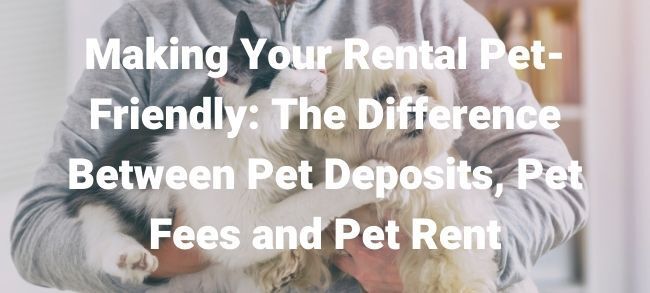The Difference Between Pet Deposits, Pet Fees and Pet Rent

Benefits of a Pet-Friendly Rental
More Prospective Tenants
As stated earlier, only a few rentals are welcoming when it comes to pet owners. Therefore, if you decide to become a pet-friendly rental unit, you’ll have plenty of prospects to choose from. Having a wider prospect pool will lead you to more high-quality tenants.
Responsible Tenants
Tenants who own pets are often more responsible when it comes to performing their duties. Pet ownership requires discipline and the ability to follow rules and regulations. Thus, most pet owners will obey pet policies.
Higher Rent
Renters who own pets already accept that they’ll have to pay an additional pet charge when renting. Naming a higher rental rate won’t come as a surprise for pet owners. As a landlord, you can earn more from a renter who brings along a pet to live in the rental property.
Generate More Income
Aside from a higher rent deposit, a resourceful landlord can also integrate useful services for pet-owning tenants. Pet sitting and pet grooming are lucrative avenues that can earn you an additional income.
Community Support
Landlords that welcome pets in their rental property encourage the community to foster a pet. In your position, you can help reduce the presence of animals in shelters. This support for a cause allows the animals to be given a safe home with new owners.
The 3 Pet Charges
Landlords typically ask pet owners to pay an additional cost in 1 of 3 different ways. It can be in the form of a pet deposit, pet fee or pet rent. Some states don’t allow some types of payments though. To understand each item better, let’s define the types of pet charges.
Pet Deposits
Pet deposits act as a security deposit for a renter. They’re fixed amounts and serve as a buffer against losses or payment for damages caused by the pet. If there are no pet-related damages after a tenancy ends, the pet deposit will be given back to the renter.
Pet Fees
Pet fees act like a ticket, allowing a renter to own a pet. This is a one-time charge and non-refundable. If there are pet-related damages at the end of the tenancy. the renter is liable to pay for the repair or replacement of an item.
Pet Rents
Pet rents act like the tenant’s monthly rental. This is usually a monthly, fixed charge to be paid since the pet is also renting his keep, in a way. The pet rent amount can differ depending on what type of pet a renter has.
Recommended Pet Charge
Pet rent is highly recommended, compared to pet fees and pet deposits. Pet fees can be extra costly. Moreover, pet deposits can be hard to separate from a tenant’s security deposit.
Monitoring both deposits can require more time and effort. In contrast, the simplicity of a pet rent as a fixed additional fee is easier to collect.
Pet Addendum
Normally, landlords attach a pet addendum to the leasing agreement. This will enumerate the acceptable conditions that act as a guide for the tenant. You can usually find the following topics for tenant's agreement tackled in the pet addendum:
- Monitor and control the pets at all times
- Adhere to local regulations regarding pet ownership
- Attend to proper health and hygienic practices on the pet’s waste removal
- Reduce the noise disturbance caused by the pets
- Attend to the pet’s healthcare and vaccinations
- Pay for any damages caused by the pets
- Adhere to the acceptable type, size and breed of pet allowed by the landlord
- Attach an identification card to the pet.
- Provide the owner with a photo of the pet
The pet addendum can also list what type of breaches must be avoided and the consequences of not honoring the conditions. This let tenants know about the repercussions and will prevent violations.
Recommended Insurance
Landlord Insurance
When converting your property into a pet-friendly one, it’s best to expand the coverage of your landlord insurance. Pets can cause injuries and accidents to other tenants living in the area.
As a landlord, you want to protect yourself from great liability. So, if unfortunate events happen, you won’t be dealing with heavy expenses.
Tenant Insurance
For tenants who own a pet, renter’s insurance will shield them from exorbitant costs. If their pet happens to cause injuries to other tenants, they can seek additional aid from their insurance company. The damages will be covered by the policy.
Bottom Line
As a landlord, you need to first take a look at the state laws regarding pet deposits, fees and rents. You can’t ask a renter for a charge that’s strictly prohibited by the law. Afterward, you can decide which type of pet charge to implement.
Before accepting tenants that own pets, it’s best to review your pet addendum. This will be the manual to follow, so make sure it’s clear and covers various situations. The rights and responsibilities of a pet owner must be detailed enough to prevent any conflicts.
If you need an established and reputable property manager in Tampa, Florida, call
Advantage Realty Services at (813) 908-8300. Alternately, you can email your inquiries at Karen@advantagerealtytampa.com. We are experienced professionals that offer a wide range of property management services and prioritize excellent customer service.











